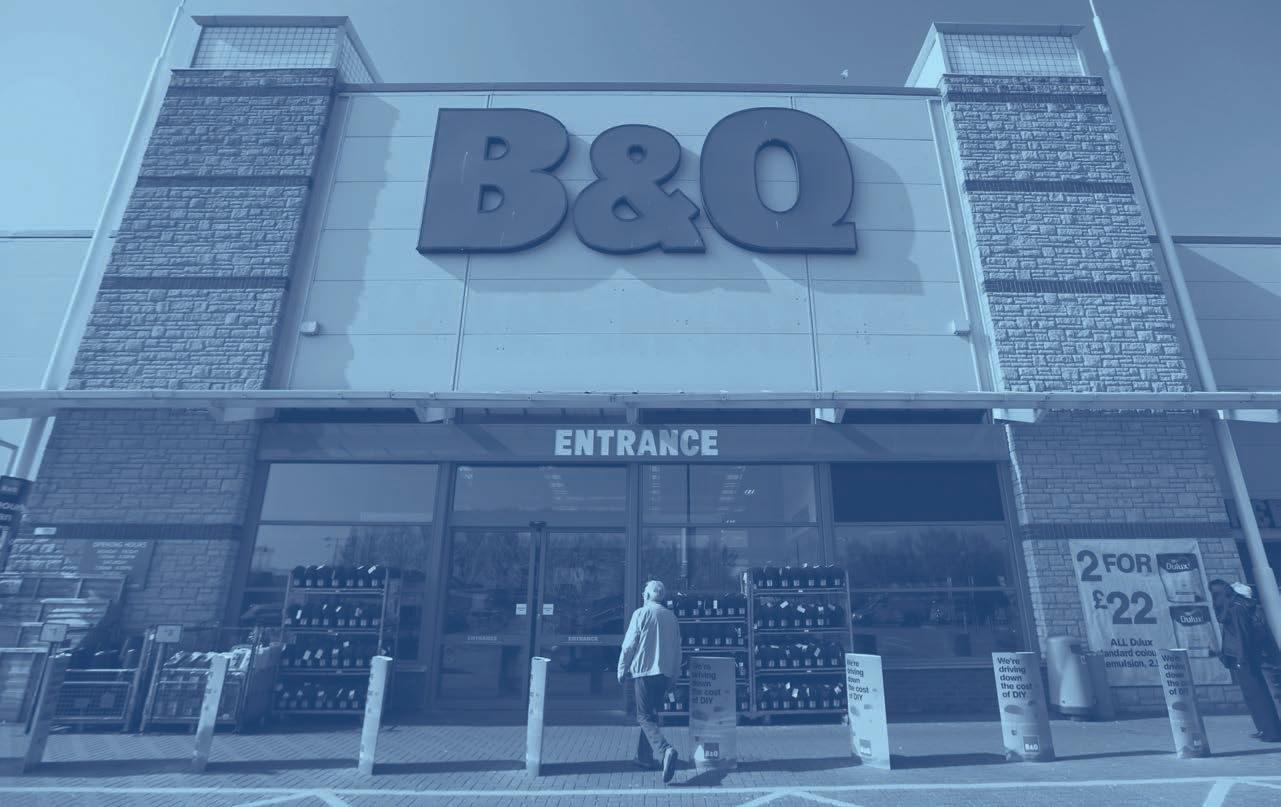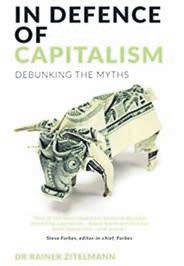OXFORD





+4.2% +5.7% +4.5% +12.1% +4.3% +2.7%
NEARLY every sector of the UK economy is powering away from a recession that was muchtipped at the turn of the year, a new survey out today shows.
Some 11 of the 14 sectors monitored by Lloyds Bank are producing more than they did a month ago, the highest number in nearly a year.


The figures crystalise opinion switching from Britain slipping into a long recession to the economy holding up reasonably well.
CHRISTOPHER DORRELL
GLOBAL bank stocks continued to recover yesterday after US Treasury Secretary Janet Yellen said the government was prepared to protect regional US lenders if necessary.
Referring to the Federal Deposit Insurance Corporation’s recent intervention to guarantee all deposits at Silicon Valley Bank, Yellen yesterday said: “Our intervention was necessary to

protect the broader US banking system. And similar actions could be warranted if smaller institutions suffer deposit runs that pose the risk of contagion.”





Investors around the world seemed to breathe a collective sigh of relief, with bank stocks in the UK, US and Europe all finishing in the green.
In the UK, Lloyds, Natwest, Barclays and Standard Chartered all closed up around the five per cent mark, while HSBC also gained two per cent.
Meanwhile in Europe, BNP Paribas rose 4.15 per cent and Deutsche Bank was up 6.05 per cent. The European wide Stoxx 600 banking index was up 3.79 per cent.

UBS climbed an encouraging 12.12 per cent, despite its outlook being downgraded to negative by both S&P and Moody’s over the last couple of days.
“UBS’s takeover of Credit Suisse has blunted the risk of a Lehman-style event engulfing European banks, and though contagion fears continue to drag on
confidence, the focus is gradually returning to fundamentals, which we think are strong across the sector,” Philip Richards, a senior analyst at Bloomberg Intelligence, said. Across the pond, the picture was equally hopeful, with Citigroup, JP Morgan and Goldman Sachs all gaining over two per cent.
£ BANK AND FED SET TO HIKE RATES DESPITE WEEK OF MARKET UNREST: P3


Last week, the country’s official forecaster canned its recession forecast, but said the economy is still on track to shrink 0.2 per cent this year.
At the turn of the year, experts including the Bank of England and International Monetary Fund were warning the UK was on track for a much tougher slump.
However, stronger than expected consumer spending, alongside measures taken by Chancellor Jeremy Hunt to boost business investment with tax reliefs, is expected to drag economic growth away from those dire forecasts.




England Live Tomorrow 7pm

OUR GUIDE ON HOW TO MAKE THE MOST OF THIS YEAR’S ISA SEASON P21-P22
Much ado about nothing?
Hardly. The loss of Credit Suisse, and the wipeout of Coco bond holders, will have consequences for years to come –but for now at least it appears as if the guardrails are holding.
Attention will now inevitably turn to the Federal Reserve and, the day after, the Bank of England. Both would be unwise,
in our view, to change from the flagged course of continued rate hikes.
It is an easier decision for Andrew Bailey et al. The Bank and others have spent the week
telling anybody who will listen that the British banks are robust, safe and sound, and well set to fight off anything thrown at them. It would defy logic then to pause on a 25 basis points hike, inevitably sending the signal to a still skittish City that there might be some nasties lurking on the balance sheet. Bailey has given himself wriggle room to pause but it would be a
show of faith in a better-thanexpected economic climate and in our banking sector to keep the pressure on.
The US has other issues. There remain fears that the wobbling First Republic Bank remains something of a canary in the coal mine for other regional banks which despite their limited geographical reach could easily become top-five all-
MEANING BUSINESS The Princess of Wales arrives to host the inaugural meeting of her new Business Taskforce For Early Childhood at Natwest’s City of London headquarters
time banking failures. The squeeze on lending in the US is likely too to be tighter than on this side of the Atlantic, with the obvious after-effects on the economy. But even then, Jay Powell has more to think about than the domestic picture. On balance, it too would be better advised to push ahead with business as normal.
Developers behind a planned $2.5bn Kent theme park to rival Disneyland have called in administrators after running up £100m in debt. The London Resort had been earmarked for the Swanscombe Peninsula, along the banks of the Thames between Dartford and Gravesend, for the last ten years.
THE TIMES
P&O BOSSES SHARED £15M AFTER SACKING 800 CREW
Bosses at the Dubai company behind P&O Ferries have shared more than £15m after the sacking of hundreds of UK-based crew last year. DP World paid directors $18.9m including bonuses, up from $17.8m in 2021, its annual report shows. The payments have triggered scathing criticism from unions.
THE FINANCIAL TIMES
UBS TO TALK WITH MICHAEL KLEIN TO TERMINATE FIRST BOSTON DEAL
UBS is set to enter talks with Michael Klein to unwind a deal that would have seen the Wall Street dealmaker take control of much of Credit Suisse’s investment bank, according to people with direct knowledge of the arrangement.
THE UK government has said it will press ahead with its plans to deregulate the country’s financial services sector, known as the Edinburgh reforms, despite widespread turmoil in the banking industry.
“We are continuing to deliver the Edinburgh reforms, which recognise the foundations on which the UK’s success as a financial services hub is built: stability, high regulatory standards, agility, and openness,” a government spokesperson told City A.M.
These sentiments were echoed by Chancellor Jeremy Hunt. Speaking in the House of Lords Economics Affairs Committee yesterday, Hunt indicated that the proposed changes might improve financial stability.
“Sticking with the status quo is not necessarily the best thing to do to maintain stability… we need to make sure we get the right balance between stability and growth potential.”
He said, however: “We will not do anything that would undermine financial stability… we won’t unlearn the lessons of the financial crisis.”
The Edinburgh reforms, announced
by the government in December last year, are designed to “unlock investment and turbocharge growth” by repealing “burdensome pieces of retained EU law”. However, the recent tumult in the banking sector has raised questions about whether the government would continue with their plans.
Among the reforms are proposed changes to bank ring-fencing rules, which were put in place after
the financial crisis to protect deposits from the riskier parts of a bank’s busi-
The government is proposing to raise the threshold at which ringfencing rules apply from £25bn to £35bn and allow firms with very small exposure to investment banking to bypass the rules.
Shadow City minister Tulip Siddiq told City A.M.: “the banking sector isn’t one that should be fid-

Hunt: financial services reforms are coming

dled around with at the moment in terms of ring-fencing.”
“Ring-fencing reforms were introduced for a good reason, to protect savers from a banking crisis. I don’t think the global investment banks should put our UK high street banks at risk,” Siddiq continued.
Dru Danford, head of investment banking at Liberum, told City A.M. there should be stricter rules for many high-street banks.
“Deposit-taking institutions may well need more stringent rules including making sure that funds on deposit are ring-fenced,” Danford said.

THE BANK of England and US Federal Reserve are this week expected to ignore the ongoing financial market chaos which resulted in Credit Suisse being pawned off in a shotgun sale and hike interest rates.
City analysts have tipped Fed chair Jerome Powell and Bank governor Andrew Bailey to prioritise fighting inflation instead of banking stability when they announce their respective rate decisions today and tomorrow.
Latest economic data points to the US economy still running hotter than the federal open market committee would like, with firms still hiring staff at a rapid pace and core inflation – seen as a more accurate measure of underlying price pressures – edging higher.
Powell and co have already raised borrowing costs at the quickest rate since the early 1980s, which has piled pressure on the global financial system and contributed to the collapse of Silicon Valley Bank and European banking giant Credit Suisse being rapidly sold off to rival UBS over the weekend.
“New problems could yet emerge, with Credit Suisse highlighting the risk of con-

tagion as fears spread well beyond the issue of unrealised losses at smaller banks,” said Andrew Hunter, US economist at consultancy Capital Economics.
Hunter added the recent batch of strong data makes for a compelling case for the Fed to lift rates, possibly by an outsized 50 basis points.
That move would send the federal funds rate to a range of five per cent and 5.25 per cent. Markets don’t agree with that conclusion, instead punting on Powell and co bumping rates 25 points higher.
Analysts have highlighted that central banks could spark investor jitters if they leave rates unchanged by suggesting they know of underlying risks in the financial system that market participants are unaware of.
That concern has partly led investment banks Nomura and Deutsche Bank to predict the Bank of England will sign off on an eleventh consecutive rate hike tomorrow of 25 basis points, a climb down from a series of 50 point rises. That would send UK borrowing costs to a post-financial crisis high, but still lower than the average of five per cent in the years before the 2008 fiasco.
THE SWISS federal finance ministry said yesterday that it has imposed “remuneration -related measures” on Credit Suisse as a result of the use of taxpayer funds to facilitate its $3.25bn takeover by rival UBS, the Financial Times reported. “More happy news,” said one Credit Suisse employee.

FIRST REPUBLIC BANK’s future looked increasingly secure yesterday as the possibility of further government support sparked a dramatic share price revival.
US Treasury Secretary Janet Yellen indicated that the Federal Deposit Insurance Corporation (FDIC) could step in to guarantee all deposits, as it did with Silicon Valley Bank (SVB), if First Republic experienced further
GOLDMAN SACHS SAID MARKETS HAD YET TO BE CONVINCED THE FINANCIAL SYSTEM IS UNTROUBLED, LEADING THEM TO BANK ON THE FED LEAVING RATES UNCHANGED:
“Fed officials will therefore share our view that stress in the banking system remains the most immediate concern for now.”
NOMURA RECKONS THE BOE WILL SIGN OFF ON A 25 BASIS POINTS HIKE:
“A strong labour market, potentially sticky core inflation in the near term, a loosening budget [last] week, some stronger data outcomes since the last MPC meeting, and the fact that 4.25 per cent doesn’t look like a particularly high end-point for rates relative to past cycles, all point to the need for a hike.”
DEUTSCHE BANK ALSO BACKED A 25 BASIS POINT HIKE FROM THE BOE, BUT CAUTIONED THE BANK WILL PAUSE BEYOND TOMORROW:
“With financial stability risks becoming more apparent, it’s likely that the MPC treads cautiously on how much further it raises Bank Rate.”
problems.
Its share price rallied nearly 50 per cent in the early afternoon.
Yellen’s speech will likely calm jumpy depositors who fear they might lose everything if they keep their cash at First Republic.
Other regional lenders also received a boost from Yellen’s intervention.
Western Alliance Bancop and Pacwest Bancorp were both up 16 per cent. The KBW Nasdaq Regional Banking Index climbed 4.4 per cent.


THE CHAIR of the Scottish Mortgage Investment Trust stepped down yesterday after a public bust-up with one of the firm’s directors over alleged “procedural violations” in its investment practice.

The FTSE 100 firm said chair Fiona McBain would step down after six years as chair and be succeeded by senior independent director Justin Dowley.

The changes come after non-exec director Amar Bhide accused the firm of alleged governance violations.

Over the weekend, Bhide alleged the firm had engaged in “a long series of procedural violations” that were “brushed aside”, as well as accusing McBain of having lost independence in her role.
Bhide raised concerns to the Financial Times arguing the firm also lacked
the knowledge for its growing investment in private markets.

After raising concerns about potential governance breaches internally last week, Bhide was asked to step down. But he refused and demanded that the firm fire him if they wanted to oust him.
In its update yesterday, however, the trust confirmed that he had now left his position.

Scottish Mortgage said in a statement that the board had “not been made aware of any procedural violations” and there had been “ample opportunity for board members to air their views and provide constructive challenge.”

The spat comes after a turbulent year for the firm as it was caught up in a global sell-off that has rocked tech firms.
Shares in the trust have plunged some 34 per cent in the past year.




A CHESHIRE biotech start-up led by a former NHS doctor floated in New York yesterday after snubbing London due to a dearth of specialised investors.
Zura Bio, which makes drugs for immune and inflammatory conditions, announced it had merged with special purpose acquisition company (SPAC) JATT Acquisition Corp in a deal that will raise $65m, which will be pumped into research and development. CEO Dr Someit Sidhu told City A.M. the UK still lacked specialised investors and “deep pockets” to win round tech firms.
“I think the biggest chasm in the UK versus the US is that level of investor appetite and ability to get investors excited around late stage ideas which are close to commercial potential,” he added.
The deal comes after a series of blows to the UK’s capital markets.
Cambridge chipmaker Arm said it would snub the City for Nasdaq earlier this month, while building supplier CRH said it would swap its listing for New York.



NICHOLAS EARL
ENERGY giant Drax has hit pause on plans to invest hundreds of millions of pounds in a new bioenergy carbon capture and storage (BECCS) project at its flagship power station, until the development is fast-tracked for approval by the UK government.
Drax plans to make its biomass generation carbon negative by capturing and burying the emissions under the North Sea – a project that is estimated to cost as much as £2bn.
Drax has told the government, however, the project needs to be approved soon in order for Drax Power Station to remain financially viable beyond 2027, or else it risks being shut down.
“Until we have this clarity, we are pausing our multi-million pound investment programme in the UK BECCS project,” Will Gardiner, Drax chief executive, said.













“Any further delays to this project could impact the UK’s security of supply, net zero and levelling-up ambitions and the viability of Drax Power Station.” Generating energy through biomass, however, is highly controversial, with Drax accused in a recent BBC Panorama documentary of cutting down older, carbon rich trees in Canada – a claim Drax denies. It has also received £6bn in green energy subsidies from British taxpayers over the last four decades, as biomass projects qualify for renewable energy subsidies. Separately, the company warned that the UK is facing a significant shortage in power that can be brought online at times of peak demand, raising the risk of supply crunches and blackouts.
Britain’s ‘dispatchable capacity’ is set to decline from 93 per cent to 85 per cent by 2027, Drax said, as the UK retires a number of inefficient fossil-fuel plants and ageing nuclear reactors.










NICHOLAS EARL

THE UK’s energy import bill more than doubled last year, as the nation became increasingly reliant on expensive overseas supplies to meet its energy needs, according to a report by oil and gas industry body Offshore Energies UK (OEUK). The cost of imports soared from £54bn in 2021 to £117bn last year, breaking the £100bn barrier for the first time.
In 2022, the UK spent about £63bn on crude oil, petrol, diesel and other oil-based fuels, with another £49bn spent on gas. The rest was spent on imports of coal and electricity.
“Being so reliant on other countries for our energy leaves the UK exposed to disruptions to supply and volatility in international markets,” OEUK said. For the UK to improve its energy security and lower its import bill, the group said the UK should support the country’s North Sea oil and gas


industry and scrap the windfall tax.

“As a result of the war in Ukraine, we have seen a period of huge price volatility but when prices fall, the windfall tax should go. We have a great British energy industry of our own, but its future depends on moving back to a fair, balanced, and predictable tax regime and the continued issuing of exploration licences,” David Whitehouse, OEUK’s chief executive, said. The government was approached for comment.

NICHOLAS EARL
SHELL will defend its lack of scope three emission targets at its annual ESG update today, City A.M. has learned, despite intense pressure from activist shareholders.
Ed Daniels, Shell’s sustainability, strategy and corporate relations director, will tell investors that scope three emission targets are dependent on customers and how they use the energy products they sell them – which is outside of their control.
Scope three emissions encompass those not produced by the company itself, but by those it’s indirectly responsible for, up and down its value chain.
Daniels will say: “These emissions can go down in two ways. First, if we stop selling products to our customers, which is not a strategy but corporate self-destruction. Second, if our customers increasingly buy energy
products with lower emissions.”
Shell will point to biofuels and electric vehicle charging as key growth areas for the company, and argue that its current net carbon intensity targets are ahead of the global energy system.
The annual ESG update today is a gathering of many of Shell’s largest institutional shareholders. The firm will look to placate its critics ahead of shareholder votes on its climate goals.
Daniels will argue Shell is determined to become a net-zero emissions business, but that it wants to do this “in a profitable way”.
It comes as activist shareholder Follow
This has filed a new motion, demanding 2030 emissions reduction goals in line with the 2015 Paris UN accord on climate change. The group’s stake in the energy giant is less than one per cent, but City A.M. understands its position is backed by multiple Dutch institutional investors.
The brand new 32-storey tower will include a food hall and retail space
PLANS to build a 32-storey tower over the City’s iconic Leadenhall Market have been given the green light. The City of London Corporation’s planning applications sub-committee approved plans this week for the new tower that will house 27,000 sq m of new office space and will look to boost the Square Mile’s “tourist appeal”.
Just Eat Takeaway yesterday announced that it will cut 1,700 delivery driver jobs and 170 head office roles, in a bid to drive down costs.

The food delivery group also said it was moving back to an entirely ‘gig worker’ model in Britain, meaning that it will no longer employ drivers directly and they will instead work on a freelance basis.
The Amsterdam-headquartered firm, which has some 15,000 employees globally, said that it will look to redeploy impacted head staff colleagues to other roles internally, while delivery couriers have been given six weeks notice with pay.
The development will include a ground-floor public hall including food, retail and event spaces and will also see the reopening of a “pedestrian” route between Gracechurch Street and Lime Street Passage.

It will also feature a fifth floor heritage garden and free public exhibition on the history of Roman London.
Last month, rival Deliveroo was also forced to slash 350 job roles across the UK and Ireland due to the economic downturn, which is deterring customers from splashing out on takeaways.

B&Q OWNER Kingfisher yesterday reported a sales slowdown as the DIY giant felt the hit from Brits scaling back on home improvements.
For the year ending 31 January 2023
Kingfisher, which also owns brands such as Screwfix, posted pre-tax profits of
£611m, down 39.3 per cent from £1.7bn in the same period last year.
As shoppers felt the hit from soaring inflation, sales were also down nine per cent to 13.05bn compared to £13.18bn in 2021. Its retail profit dipped 19.7 per cent to £923m for the year.
The listed retailer previously indicated its sales and profits had

weakened over the past year, largely due to the DIY demand from lockeddown customers starting to soften.
Despite this, Thierry Garnier, chief executive of Kingfisher, said the group remains “confident” about the outlook for the year ahead and is looking to accelerate its store openings across mainland Europe and the UK – with
As Brits have begun to enjoy life outside again post-pandemic, the nation’s desire to repaint their entire home is slowly dwindling –as is the time to do it, now there’s more scrutiny of how much time you’re actually working at home. Accordingly, analysts have warned that 2023 will be very difficult for the UK home improvement sector, particularly for DIY players.
“The cost of living crisis and slowdown in property markets are going to put a big dent in the sector’s growth outlook. Kingfisher will be thankful that the trade side is slowing less, thanks to the massive Covid-19 backlog of home renovations still taking place," Zainab Atiyyah, analyst at Third Bridge, said yesterday.
some 25 Screwfix sites set to open in France this year.
Moreover, Kingfisher saw like-for-like sales increase 1.9 per cent in February.
Garnier said the firm had focused on delivering “value” to its customers while also managing “cost inflation pressures”.
Kingfisher shares closed down 1.46 per cent after the results.
“B&Q is more vulnerable to reductions in consumer spending than other players because of its gearing towards DIY sales. Our experts say the best B&Q can do is to hold its market share. The DIY sector is not going to grow massively any time soon.”

 LAURA MCGUIRE
LAURA MCGUIRE
THE FOUNDER of famed short seller
Muddy Waters has slammed European rulemakers for “regulatory overreach” today and said the EU’s anti-short seller position was distorting markets.

Speaking with the Alternative Fund Insight podcast, Carson Block, who has waged campaigns with Austin, Texasbased Muddy Waters against London firms including Burford Capital and NMC Health in London, laid into rules in Europe which require short sellers to disclose positions in companies publicly.
Block’s $230m outfit Muddy Waters bets against the stock of companies before publicly calling out faults and profiting from falls in its share price. However, he said his operations across Europe had been hampered by red tape. “There is no question in my mind that the public disclosure requirement has discouraged short selling [in Europe],” he said. “It has also made pricing less efficient and distorted trading.”
Regulators in the UK are currently mulling repealing EU-era short-selling rules in the UK as part of a sweeping
post-Brexit regulatory refresh.
The Financial Conduct Authority currently publishes a full list of disclosed short positions daily after the European regulator mandated firms in 2012 to disclose short positions of more than 0.5 per cent of total issued share value. He claims the tweaks were a “solution in search of a problem”, however.
“I am sympathetic with the perception that the EU is frequently engaged in regulatory overreach,” he said.
Block said the consequence of the rules in practice was that short sellers slowly build up a position to the disclosure threshold before quickly ramping up their position after passing it, which distorted pricing.
“[Short sellers] don’t win because we are getting lower entry prices. If you are of the view that short selling is damaging long holders, well that doesn’t help long holders,” he said.
UK lawmakers have thrown their weight behind repealing regulation on short selling in recent weeks. City minister Andrew Griffith said in a speech this month that short selling was an “important tool in financial markets”.

THE CHIEF of Legal & General slammed a slide in pension funds’ equity holdings yesterday as calls grow for the City’s top institutional investors to back UK stock market. Speaking with media, L&G boss Sir Nigel Wilson (pictured) said pension funds’ shift towards bonds over the past two decades
JAMES SILVER
A LONDON-BASED AI-powered climate tech firm has raised significant funding –including from venture capital outfit Counteract –to measure and monitor farms’ carbon footprints.

Ben Bardsley, a former army officer and founder of BX, said he was “delighted... to unlock the capital raise in a very difficult investment market.”
BX uses technology to take historic soil data, combine it with farming
practices and suggest ways to transition to what is known as regenerative farming.
“The food and agriculture sector has a critical role to play in addressing climate change, however they require technology to enable their transition to climate friendly practices facilitating information about the impact of their actions,” Counteract managing partner Matt Isaacs said. It is estimated that 40 per cent of the world’s emissions come from food production.
had hampered Londonlisted firms’ growth.
“A big thing that we’ve done is de-equitize,” Wilson said. “Since Gordon Brown in 1997 started taxing pension funds in an unusual way, and created a huge amount of money for the Treasury, it’s led
to systemic under-investment in equity, particularly growth equity here in the UK.”
His comments come amid a wider pressure campaign on pension funds to ramp up investment in domestic firms. City revealed talks in January between tech figures and pension chiefs to boost start-up investment.


BORIS Johnson yesterday denied “intentionally” misleading parliament over alleged breaches of lockdown rules during parties at 10 Downing Street.
While Johnson acknowledged his claims to MPs –that Covid-19 rules had been “followed at all times” –did not “turn out to be correct”, the former Prime Minister denied deliberately misleading parliament. He added it “remains unclear” to him – and possibly to Rishi Sunak – why they were fined for breaching lockdown laws after the Met Police investigation into partygate.
The comments were published in a defence dossier submitted ahead of a marathon televised evidence session before








the cross-party parliamentary privileges committee today.
Elsewhere in the dossier, Johnson says he has accepted he misled MPs but insisted his partygate denials were made “in good faith” based on what he “honestly” knew at the time.
He insisted he “did not intentionally or recklessly mislead the House”.
Johnson has received an estimated £220,000 of taxpayers money to mount a legal defence to the probe by the privileges committee, according to the PA news agency.
If Johnson fails to convince the committee that he did not deliberately mislead parliament, he could be found in contempt and suspended. This could ultimately lead to a by-election in his Uxbridge and South Ruislip seat.
After all the huffing and puffing, Johnson’s defence dossier is finally here.
Will the £220,000, 52-page document blow the House down or is his blockbuster committee appearance set to land him in even hotter water?
The stakes are high: he risks a possible Commons suspension, a recall petition and, potentially, even a by-election.
But despite vastly greater earning potential, life as a civilian clearly lacks appeal for the would-be ‘world-king’.













So today’s performance is likely to feel like a life or death affair to Johnson.
The key thing is that while the Covid-19 rules –his rules –that he stands accused of disobeying were, for many, just that, there are others who equally fervently believe they were a mistake.


It will now be up to the MPs to decide to what extent Johnson’s detailed denials exonerate or condemn him.
But, without any truly gamechanging revelations, it’s hard to see his evidence changing many already made-up minds.

JESSICA FRANK-KEYES
On the Mirror’s original partygate scoop: “My initial reaction at the time was that this was some kind of try-on… I did not anticipate that this would be a big story.”
On the birthday party he was fined by the Met Police for: “I was not told in advance that this would happen. No cake was eaten, and no-one even sang ‘happy birthday’”.
On gatherings in Downing Street during lockdown: “My view has always been that thanking and encouraging staff, and maintaining morale at No 10, was absolutely essential for work purposes.”
HOW did you go bankrupt?”
“Two ways. Gradually, then suddenly.” Hemingway’s wisecrack could be the epitaph for Credit Suisse, whose ignominious end caps a series of disasters at the Swiss bank, eventually bringing it to the brink on Sunday.
UBS has probably done rather well, picking up CS for cents on the dollar, even if it will take years before we know whether it rues or cheers the demise of its biggest rival. BofA says “the industrial logic is impeccable”, though the inevitable schadenfreude at UBS is surely tempered by no small quantity of angst.
The question hanging over investors: is it over? Calm was restored to wider financial markets by Monday afternoon and continued yesterday.
But the pack is sniffing out weaker members: a US regional bank of impeccable quality called First Republic Bank seems to have been isolated from the herd. It’s another Bay Area bank (the San


Francisco Fed has some questions to answer) with a similar bunch of large, rate-sensitive, flighty and herding depositors as Silicon Valley Bank.
Shares jumped yesterday but remain down heavily for the yearto-date. The lesson of the last two weeks is that in banking a confidence crisis can lead to liquidity and funding problems that can spiral into solvency trouble.
Jamie Dimon of JP Morgan is leading the effort to shore it up.
Undoubtedly, investors will continue to circle, and banks and regulators circle the wagons. FRC is in the firing line, but Wall Street is closing ranks in an effort to save it.
It’s too early to say if this is over.
The relief rally after the Bear Stearns rescue lasted months. It probably only ends when investors stop asking ‘who’s next?’
Meanwhile, the last two weeks probably make a recession closer and bank lending will undoubtedly dwindle. This might keep inflation in check.
The Federal Reserve faces a dilemma today – keep the hammer down on inflation or bow to financial stability concerns. Nomura says cut, Barclays, Goldman Sachs and Natwest say pause. Citi, among others, says to go for a 25bps hike. Market pricing is more assured – 80 per cent chance of 25 basis points, 20 per cent chance of a pause. Looking through a wider lens, we are in a new phase of the cycle where central banks are trying to explicitly separate monetary policy from financial stability policy.
£ The Swiss caused a stir with the way they brought UBS to the table by wiping out ‘CoCo’ bond holders while leaving shareholders with something. The BoE and ECB were quick to rush out statements saying they wouldn’t treat these ‘contingent convertible’ bond holders so shabbily. There is a question about whether there is a future for CoCos. But it also comes down to the more mundane: some banks’ CoCos get wiped out, others get converted to equity. It pays to read the small print.
£ The newly minted US arm of Silicon Valley Bank is now marketing itself as the single safest “place to keep or transfer your deposits (fully insured with no limits or caps)”. This was in some marketing material.
In a conference call, new CEO Tim Mayopoulos said: “There is no safer place in the US banking system to put your deposits.” You cannot make it up. Talk about moral hazard (and I have). But I guess he has a point. Question now is whether deposit insurance is extended.

Credibility in Swiss banking has not been destroyed, but the situation is not good


Dr Marcel Rohner, Switzerland’s Banking Association chairman, after the Credit Suisse collapse
Turgid, too long, apt to make you yawn... all true, but it’s time to look again at Atlas Shrugged by the inimitable Ayn Rand. As the world goes increasingly stark raving mad and communist, it’s a heavy bulldozer of sanity; even if the philosophy – when taken to the extremes of the book – is not terribly viable. But that’s not the point – you’re not supposed to take it to the extreme, but think for yourself. Just as Citadel founder Ken Griffin warns that American capitalism is “breaking down before our eyes”, it’s a timely reminder of the dangers of moral hazard, bailouts and big statism.

LONG, BUT NOTHING TO SHRUG AT EVEN NOW





The City of London has been facing a crisis in confidence recently with a string of stories suggesting London no longer holds its edge as a world-leading financial sector.
But despite hand-wringing in the Cityparticularly following ARM’s decision to list in New York –Deutsche Bank UK’s CEO Tiina Lee cautioned against this “end of the world narrative”.



“There’s been a lot of focus on listing and the attractiveness of London as a listing location but of course the financial services sector in the UK is way broader than that … Financial services in the UK had a trade surplus of £110bn according to the latest numbers I’ve seen. That’s a lot of activity … [take the FX market]: twice as many dollars are traded in London as in New York.”
Looking beyond ARM, much of the City’s declinist narrative stems from the UK’s decision to leave the EU in 2016. Individual opinions differed, but it was apparent the tide of opinion in the City was to stay a part of the bloc.
However, Lee said Deutsche Bank itself is in a “sweet spot” as a bank based in “the heart of Europe” with a London home. It moved “low hundreds” of staff to the EU following the vote. Now there are more fixed-income traders in Frankfurt than ever before, but it still has a large operation in the UK.

In short, Lee says the bank is “very well positioned to have the best of both worlds”.

From a UK perspective, Lee said she “has to see things with a glass half full approach…we think that the UK will continue to have real strengths.”
Though Brexit has no doubt been damaging for the City, there are signs there might be some progress in improving relations between London and the EU following the signing of the Windsor Framework.
In particular, there are hopes that the deal could stimulate progress in financial services by allowing for greater alignment between the two authorities.



Lee said she was “cautiously optimistic for more engagement on financial services” following the recent breakthrough on the Northern Ireland protocol.


The City is also holding out hope for the government’s regulatory changes, the Edinburgh Reforms. The government hopes the proposals will unlock millions in extra investment to stimulate growth across the country.

Lee said the reforms were a “good first step”, but, at this stage, remain “an intention”. She noted it would be particularly interesting to see how the competitiveness mandate works for the UK’s financial regulators.




Deutsche Bank has been in London for a long time. It celebrated its 150-year anniversary earlier this month, and Lee is adamant that London will remain an important market for Deutsche Bank. As she notes, the UK still has the “largest wallet” in EMEA despite its wider economic problems.
Unlike some other European banks, Deutsche Bank has successfully managed a restructuring process. In 2019 the company launched a new strategy to streamline and focus on its core strengths, exiting equity trading and prime broking, and reducing its client perimeter.

In its most recent annual results it recorded its best profit numbers for 15 years.
Later this year, many of the bank’s London-based staff will start moving into the new headquarters, one of the largest new-build bank offices in the City.
Having completed its restructuring, the bank’s focus is now on growth. Like




Deutsche Bank more broadly –which has set out its intention to be a ‘Global Hausbank’ –the UK arm is attempting to build up different parts of its franchise to reduce its dependence on investment banking and deepen its relationship with existing clients.

This means focusing on the international private bank and wealth management, areas where Lee said there’s “real opportunities in the UK to gain a market share”.
The bank hired 35 client coverage bankers to cover the 26,000 individuals with connection to the UK. Last year it appointed James Whittaker, formerly of UBS, as CEO of its wealth management business.




But Deutsche Bank is far from abandoning investment banking, particularly in the UK following a series of new hires in senior positions.
“It takes time to get a return on investment…but the increased seniority of the team will help ensure we remain market leading in the UK. We want to be the leading European investment bank as well as a leading advisor to European corporates.”

Stockport named ‘one of the coolest areas of the country’ by The Times









8 minutes by train to Manchester city centre. Under 2 hours by train to London
Largest economy in Greater Manchester, topping UK regional growth forecasts Capital growth is forecast to increase by 19.3% in the next four years*
Limited investor options, high tenant demand Regeneration area with funding from Stockport council and The Heritage Fund Rental growth is forecast to rise by 21.6% in the same period*


is phase one of a small residential development in the heart of The Underbanks regeneration area, built by a family run developer with a 25 year track record.








1&2



from just £173,000
Estimated completion Q3 2024. Many apartments have private entrance, outside space or winter gardens.
FOR ASlong as there have been anti-capitalists, they have been anticipating the great crisis that would bring about the final, irreversible collapse of capitalism.
Karl Marx believed he had discovered a number of economic “laws” that would inevitably lead to the downfall of capitalism, such as the “tendency of the rate of profit to fall” or the impoverishment of the proletariat.

For anti-capitalists, economic crises have always, above all, been a source of hope – that capitalism would finally collapse in on itself. Unfortunately for them, their hopes have been dashed over and over again. In many ways, anticapitalists are a bit like a doomsday cult, undauntedly announcing new dates for the end of the world after their previous prophecies went unfilled and life carried on as normal.
In the 2008 financial crisis, anti-capitalists believed that the long-awaited end of capitalism had finally arrived. When capitalism survived this crisis, they were forced to wait and draw hope from the coronavirus crisis of 2020-21.
Even in the earliest days of the Covid-19 pandemic, left-wing intellectuals frequently expressed their wistful hopes that the pandemic would finally achieve what they had dreamt of during the financial crisis of 2008, namely a fundamental reorganisation of society and the final defeat of capitalism.
William Davies, a British sociologist, published an article in The Guardian under the headline: “The Last Global Crisis Didn’t Change the World. But This One Could”.
Crises are part of capitalism, and even if the short-term effects bring great problems for companies and their workers, they have very positive effects in the medium and long term, which is what the Austrian political economist Joseph Schumpeter was referring to when he coined the term “creative destruction”.
But when politicians interfere, crises often become worse and last longer than necessary. The U.S. economist Thomas J. DiLorenzo compares the approach adopted by the American government under President Martin Van Buren to deal with the depression of 1837 with the response of President Franklin D. Roosevelt to the Great Depression of 1929. Van Buren pursued an unequivocally laissez-faire policy and resisted all proposals for direct government action and interventionism, which led to a very rapid end to the crisis.
In contrast, Roosevelt launched his “New Deal”, which relied on a compre-



hensive series of government programmes and pursued an anti-capitalist, interventionist policy. Contrary to the myth spread by anti-capitalists that the “New Deal” ended the crisis, Roosevelt’s policies actually prolonged it. Unemployment, which had been as low as 3.2 per cent in 1929, climbed to 14.6 per cent by 1940. The average unemployment rate from 1933 to 1940 was as high as 17.7 per cent. Per capita GDP in the United States had been $857 in 1929 and, at $916, was still barely above that level eleven years later in 1940. Personal consumption expenditure, which had totalled $78.9 billion in 1929, fell to $71.9 billion in 1940.
And what about the global financial crisis of 2008? Politicians and the media blamed the “deregulation” of financial markets. But even the British economists Paul Collier and John Kay,
who have wrongly argued that “market fundamentalism” has come to dominate economic policy in Western societies over recent decades, are forced to concede: “Those who blame the financial crisis on deregulation fail to recognise that there is today, and was in 2008, far more financial regulation than ever before: the state was increasingly active, yet decreasingly effective”.
Nowhere are there fewer free-market economic principles than in the world of finance. And no sector is so heavily regulated and supervised by the state, with the possible exception of the healthcare industry. The fact that precisely the two areas of the economy that are most strictly regulated by the state are the most unstable should give critics of capitalism pause for thought. Of course, regulations are necessary in both of these areas. But the slogan ‘more regulation helps more’ is patently wrong.
The vast majority of crises are simply features of the regular ebb and flow of normal economic undulations, i.e. the cyclical intensifications and slowdowns of economic growth, which fade away after a few months or even a year. And, unarguably, many of the crises that have occurred over the last 120 years or so have been triggered, or at least considerably prolonged, by populist interventionism from political leaders.
£ Dr Rainer Zitelmann’s new book, In Defence of Capitalism, has just been published and is widely available.

On July 2023, the FCA’s Consumer Duty will come into effect. Its stipulations include rules requiring banks to deliver fair value, communicate more transparently, and overall do more to meet customer needs and deliver the service they require.
According to YouGov BrandIndex, the public are broadly positive about their banking experience across the sector; on average, 72% of customers over the past year rated their providers positively. But while 48% said their institutions provided positive value for money, 47% were neutral and 5% were negative. For perceptions of quality, a mere third (33%) were positive, with the remainder neutral (60%) or negative (7%).
Stephan ShakespeareOur data shows that nearly two in five consumers (36%) say that value for money is an important consideration when choosing a bank – right after trust (43%). So there could be room to improve these sentiments from a commercial and regulatory perspective. Other factors such as digital accessibility (33%) and customer service (33%) are also among the
top motivations chosen.
Evidence suggests that a portion of British consumers are unhappy with how banks are performing in some of these areas. While half (52%) trust banks and building societies, a quarter (26%) do not – and a third of consumers (34%) actively think banks try to trick them out of their money, with two in five (42%) believing the opposite. Perhaps most tellingly, seven in ten (72%) think all banks are “basically the same”, which could suggest that not enough is being done to differentiate products or services.
It's easy to view Consumer Duty as a stick for banks but there is plenty of carrot here too, given how much of the public views them as untrustworthy, interchangeable, or outright devious.
If they change these perceptions –whether out of a sincere desire to do better by their customers or fear that they will run afoul of the regulator –
banks stand to benefit. Stephan
the co-founder and CEO of YouGov


Nowhere are there fewer free-market economic principles than in the world of heavily regulated finance
In the fourth of an eight-week series, German historian and sociologist Dr Rainer Zitelmann makes the case that capitalism is the answer to many of the world’s problems –not the cause. This week, he mythbusts the idea that free markets lead to crises


LONDON’s FTSE 100 yesterday
shook off market turmoil sparked by UBS saving Credit Suisse, with the UK’s largest lenders, such as Barclays and NatWest, soaring to the top of the index.
The capital’s premier index surged nearly two per cent to 7,536.23 points, while the domestically-focused mid-cap FTSE 250 index, which is more aligned with the health of the UK economy, climbed 1.54 per cent to 18,779.10 points.
Markets have been highly volatile over the past few days, driven by investors digesting whether the shotgun sale of Credit Suisse to its main rival UBS could signal more trouble in the global banking system is on the way.

European banking stocks had been in freefall over the past few days, but most of them regained ground today. Barclays surged to near the top of the FTSE 100, gaining 5.31 per cent, while NatWest advanced a similar amount.
The continent’s top lenders also bagged strong gains during opening exchanges. Germany’s Deutsche Bank shot up more than five per cent, France’s Societe Generale added more than four per cent and Spain’s Santander jumped nearly five per cent.
UBS also skyrocketed around 12 per cent despite credit rating Moody’s downgrading its opinion of the firm.
“Sentiment has turned more positive across European markets with banks outperforming after the turmoil in recent sessions,” Victoria Scholar, head of investment at fund manager interactive investor, said.

Fears over whether the banking system could wilt under the weight of central banks globally lifting interest rates steeply have spread rapidly over the last week after US lender Silicon Valley Bank collapsed earlier this month. Investors zeroed in on Credit Suisse over the weekend and pulled their cash out of the firm rapidly.
Analysts at Peel Hunt said that Alliance Pharma, the international healthcare business, FY22 results are “exactly in line with its trading update in January”. Underlying profit before tax was £30.3m down from £42.2m in FY21. Despite the loss, analysts said that the outlook for FY23 is positive as the company expects Kelo-cote growth above 20 per cent. “We think today’s results are an incremental positive,” analysts said. The analyst rated it a “hold”.

Analysts at Peel Hunt said that construction firm Henry Boot delivered a “record underlying profit” of £56.1m in FY22, well ahead of last year’s £29.3m. However, due to the housing market current climate said that they remain “cautious” about the company for the year. “The timing of some of the group's lumpier projects is likely to remain uncertain, and estimates for the year are likely to reduce by c.£4m, to £38m,” analysts said. The analyst rated it a “buy”.

POSITIVE SENTIMENT “Sentiment has turned more positive across European markets with banks outperforming after the turmoil in recent sessions”
VICTORIA SCHOLAR, INTERACTIVE INVESTOR
 Rosie Beacon
Rosie Beacon

EARLIER this week it made prime time news that the food tsar, Henry Dimbleby, had resigned due to government inaction on obesity. Reducing obesity – famously an enormous strain on our health service – is primarily a preventative action. While this is no doubt an essential ambition, one’s mind does wander to where the equivalent of Henry Dimbleby is for so many other over stretched public services. Post pandemic and post austerity, public services tend to be geared towards acute need, over stopping that acute need occurring in the first instance. There is no truer example of this than crime. Indeed the myopic focus on getting more bobbies on the beat has arguably entrenched a reactive approach.
But unfortunately the harsh reality is often that by the time the police or the criminal justice system get involved, a whole range of opportunities to intervene over five, ten, fifteen years could have been missed.
I do accept that it’s instinctively less appealing for a politician to tell a constituent on the doorstep about experimental strategies to reduce crime in ten years when they may have legitimate and tangible concerns in the now. But the notion that political short termism, among other things,
could so consistently get in the way of public service outcomes is an indictment on our once world leading, visionary welfare state. With this said, there’s different ways in which crime can be prevented, and it does not always involve the public sector. A little known but remarkable fact is that some crimes, such as domestic burglary, have fallen significantly across all industrialised nations over the last twenty years, despite these nations having very different approaches to policing and criminal justice. In England and Wales, it fell by 81 per cent. There is a similar story with the fall in car crime – which fell by
79.5 per cent between 1995 and 2019. The reason for this is not extravagant policing and crime policy, but improved home security. Burglary was essentially designed out of the system. Replicating this preventative zeal with the private sector now would look something more like designing out fraud – the single largest category of crime in England and Wales – from online platforms.
But look to the increase in serious violence among young people, and the deficiencies of the public sector in prevention become glaringly obvious. It is a well established criminological finding that a person’s background influ-

ences criminal risk. These vulnerability factors can include growing up in care, exposure to domestic abuse, absent parents, low attainment in school, absence from formal education, and many more. Given the complexity of this vulnerability, it is not merely a matter of ‘designing out’ but piecing together various moving parts.
With this in mind, the headwinds for the next few years look somewhat concerning. Astonishingly, the number of section 47 enquiries – investigations carried out to assess if there is risk of significant harm to a child – have grown by 184 per cent since 2008, according to the Association of Directors
ACROSS the political spectrum, the number of small boats crossing the Channel has occupied a huge slice of our collective consciousness. At one level, of course, these are stories replete with human suffering and tragedy.
On another level, for those in the UK, it is a question of control over our borders.
In trying to grapple with the issue, we must first understand why passengers are willing to make such a potentially dangerous journey, even with the risk it could be years before they can settle here - if at all.
If we were willing to overlay the Brexit debate with the immigration issue, one could cheekily ask why people are leaving countries like France, which are part of the purported paradise of the European Union to move to “Broken Britain”?
On this view of the UK, all we would need to do to stop the crossing is to send delegations to explain to refugees
Paul Ormerodconsiderable uncertainty about the potential costs involved in any such journey.
But it is even more unlikely that large numbers of people are consistently making irrational choices year after year. The plain fact is that the liberal democracies, and in particular the US and the UK, are highly desirable places in which to live and work.
of Children’s Services. Just over 40 per cent of free school meal eligible secondary pupils were absent during the 2021/22 autumn term, according to research from LSE. Typically around 15 per cent of secondary pupils were registered as persistently missing from the classroom during the pre-pandemic years.
But the fact that I am quoting statistics that would traditionally fall into the remit of the Department for Education is actually part of the problem.
If so much of crime prevention rests on early years intervention for example, the costs end up falling to one department while another one accrues the benefits. Nobody explicitly has responsibility for crime prevention.
And this rather inelegant disconnect between services translates on the ground too. Resource is so often spent on managing the queue and referring individuals from social care to one police force to another police force to youth offending back to social care. This demonstrates just how many missed opportunities there often are for at least one public service to make a successful intervention.
The problems of prevention should act as a necessary reminder that public services are all essentially working towards the same goals of human welfare, and better prevention should be a logical by-product of such unity. There needs to be a fundamental re-orientation of our public service provision: so much of the political focus is on ensuring the police are able to respond, but more of the focus should be on ensuring they don’t need to respond at all.
the true state of things in Britain. Of course, this doesn’t happen, and the two issues are separate ones. But it remains true that despite our problems, the UK is a liberal democracy.
In the US, we can see the same state of affairs on a much bigger scale. Despite its well-documented social, cultural and political challenges, large numbers of people around the world move to America legally and illegally. The same cannot be said for Russia or China.
It is unlikely the assumptions about rational choice, made in the basic economic textbooks, apply in these situations. In particular, there is
The focus of the government on the immediate problem is understandable.
The short-term pressures of the electoral cycle are strong everywhere. But the huge attractiveness of the West raises serious issues when we look ahead to, say, the middle of the century.
We do not have to go along with the worst of the climate predictions to appreciate that major ecological changes are taking place. From extreme floods to extreme heat, increasing numbers of people have increasingly strong incentives to move from their current locations.
It is fair to say that policies are in
place to address the challenge of climate change. Some say they do not go far enough, but they do exist.
But much greater vision and foresight is needed by the democracies. The German Chancellor Olaf Scholz was the first leading politician to raise the question of a Marshall Plan for Ukraine, an American initiative instrumental in rebuilding Western Europe after the Second World War. He’s not wrong. We do need one.
But we also need one to assist those areas which are projected to suffer most from climate change. It is in our own self-interest to do this.
Otherwise, America, Britain and, yes, the European Union could become the destinations of choice for tens, if not hundreds, of millions of people. The current numbers will seem a mere trickle in comparison with the potential torrent in two or three decades time.
£ Paul Ormerod is an author and economist at Volterra Partners LLP
Unsurprisingly, Rishi Sunak faces a host of Brexiteers voting against a key part of his new deal over Northern Ireland today.


----[Re: Credit Suisse turmoil eases as Barclays and NatWest claw back losses, yesterday]
The world’s banking system runs on legacy technology and historic practices. This impacts the holding and moving of liquidity, preventing funds from moving efficiently around the world. This is bad enough in stable times, but when banks and central banks need to act fast in times of market stress, it’s particularly painful. We have seen six central banks yesterday launch a US dollar “swap line” arrangement to boost the flow of US dollars through the global financial system and enhance the provision of liquidity, after an unsettled period in the US banking sector and the Credit Suisse takeover.
By replumbing the financial networks that support cross-border payments, these multiple points of friction and lack of visibility can be addressed. There is growing demand for a system that enables payments to flow faster and more reliably, removing friction and creating complete visibility over pools of liquidity around the world. Through this system, every international transaction could be matched to corresponding real-time institutional liquidity, and if funds are available, money can move between banks instantaneously and ondemand.
In times of economic instability, inefficient processes and slow transaction speeds become even more problematic. It’s time banks prioritise removing all risk associated with moving money around the world, and adopt new technologies that will revolutionise the global payments industry.
 Marcus Treacher
Marcus Treacher
 Elena Siniscalco
Elena Siniscalco

THIS month, British supermarkets including Tesco, Sainsbury’s and Waitrose agreed to pay for audits on British farms to inspect the conditions of foreign seasonal workers and combat abuse. They caved to pressure from investors, worried about their exposure to potential abuses in supply chains.
Up to 45,000 people can come from abroad to work on British farms this year. The shortage of fruit pickers is so bad the government has said an extra 10,000 visas will be made available if needed - we’re talking up to 55,000 people doing the hard work so you can eat your greens.
Fruit pickers come to the UK through the seasonal workers scheme - a special visa programme allowing them to work in the country for six months. Until recently, they came mainly from Romania and Ukraine, but war has driven recruiters elsewhere. People are now arriving from Kyrgyzstan and Tajikistan, Indonesia and Nepal to pick vegetables.
The licensed operators in the UK work with their overseas agents to recruit workers in their home countries. Workers pay to get a visa and have no choice but to leave after six months.
So, we’ve passed the spring solstice and some rail strikes are coming to an end.
The members of the RMT Union, led by the face of the Winter of Discontent, Mick Lynch, have agreed a pay deal which the rail union has said amounts to a pay rise of 14.4 per cent for those on the lowest salaries and 9.2 per cent for the highest paid. But this is only for signal staff and maintenance workers. Other rail employees are still set to strike at the end of this month.
Elsewhere, more than 1 million NHS workers will be offered a 5
per cent pay increase to put a halt to further strikes within the health service. Inflation is expected to head down to less than 3 per cent by the end of this year, which should push down consumer prices. Even still, the Office for Budget responsibility has forecast the biggest fall in living standards over the next two years. This means that even though there has been a pause on strikes disrupting the country, there is still a very real possibility of a return to days of strikes on end.
The scheme has boomed in recent years - going from welcoming around 2,000 workers to 40,000. But oversight hasn’t kept up. In the UK recruitment fees are illegal, but many operators abroad ignore the rule and convince the workers to pay high sums of money to get into the scheme. Workers arrive in the UK with masses of debt they are unable to pay when they return home.
According to Andy Hall, an activist campaigning for Indonesian and Nepalese workers, climate change has made this even harder.
“Often there is no season,” he said. Workers are paid based on what they pick, so if the harvest is poor, they’re paid less than they envisaged.
To limit the potential for debt bondage, British operators stopped recruiting from Asian countries. But many are already on a two-year contract, or back home and in huge amounts of debt.
Ali and Faisal, whose names have been changed for anonymity, are two of the many workers wound up in debt. Both from Indonesia, Ali borrowed money from family and used
savings to pay for the process of recruitment - a total of £4,384. He still owes almost £2,500 to his family. Faisal only worked for three months of a six month contract. What he earned couldn’t even cover his costs to get to the UK.
“If you’re recruiting people from very far away, the risk of them being exploited within the recruitment supply chain increases”, says Kate Roberts of Focus on Labour Exploitation.
And the risk of exploitation endures in the UK. Because the operators have both an enforcement and a protection role, workers don’t feel comfortable speaking up. They live and work in often remote locations, where their employer is also their landlord, and this further impairs their options.
The Home Office hasn’t exactly been over-excited by the prospect of investing further resources to protect seasonal workers. “The big thing for me is the lack of transparency from the government”, says Tony Lloyd, a Labour MP who has raised the issue a number of times in Parliament. He says there
are no clear channels for monitoring and it’s almost impossible to know if working conditions are being met. But stakeholders have finally acknowledged there are structural problems with the scheme. Sophie De Salis, sustainability policy advisor at the British Retail Consortium, says the final aim of the audits is to create “an aligned, transparent and robust due diligence process”. The Gangmasters and Labour Abuse Authority - which is in charge of handing out licences to operators - told City A.M. they are actively working on prevention measures aimed at “educating workers about their rights in the UK” and warning them not to pay to be recruited. Agriculture, as an industry, leaves open loopholes for exploitation. These issues are not unique to fruit pickers, but concern also poultry workers and butchers across Europe. Seasonal workers operate like invisible ghosts through a speedy machinery that takes them in and out, in and out of the country. It was about time someone noticed them.
WITH just over two weeks left until the end of the tax year, savers may still be considering how to use their annual tax-free ISA allowance.
You can use your allowance whether you are looking at setting up a regular savings plan, or investing a lump sum, or even considering putting some cash aside for children or grandchildren.
“As we approach the end of the tax year, many investors will be stuffing lump sums into their ISAs to beat the call for last orders on 5 April, but there are compelling reasons why they might set up a monthly ISA investment plan at the same time,” explained Laith Khalaf, head of investment analysis at AJ Bell.
“Returns over the last twenty years suggest that you should get your money into the market sooner rather than later.
“For example a £20,000 lump sum invested in the typical global equity fund 20 years ago would now be worth £118,570.
“A comparable regular investment plan of the same amount in total, or £83.33 a month, would now be worth £51,360, less than half the value, despite the same outlay in cash terms.”
Khalaf pointed out that these figures do come with “large caveats attached”.
“If you have £20,000 to invest as a lump sum, but decide instead to drip feed it monthly into the market, then you can expect to get interest on it while you wait. This could boost returns significantly over long periods of time.
“Assuming a four per cent interest rate on standing cash, £20,000 invested in a global equity fund in monthly chunks of £83.33 over the last 20 years would now be worth £70,295. However, that still falls far short of what a lump sum investment would provide, again as a result of the higher compound returns provided by the market.”
He added: “The power of compound market returns is a humbling force, which tends to favour lump sum investing over monthly savings, simply because more of your money is in the market for longer. But when it comes to the losses you sustain in market downdrafts, it’s the regular savings plan which wins the day, because less of your capital is exposed, and your monthly contributions continue to buy shares at cheaper prices.”
Ed Monk, associate director for Personal Investing at Fidelity International, shares his tips on investing in an ISA during times of uncertainty and explains why the current economic backdrop should not deter you from meeting that 5 April deadline.
“As the tax year comes to a close, and you’re checking that you’ve made the most of all your tax-free annual allowances, it’s a perfect time to review your portfolio. Our investment goals and attitude to risk can change over


“I’ve been saving with Plum since 2019. I was investing for the first time, so before I found it complex and foreign. The app helps pre-select funds and provides the basic information. I also like

time, so ask yourself if your current portfolio still aligns to your investment objectives and appetite to risk.
Rebalancing your portfolio can also have its benefits during times of uncertainty. The way to do it is by adjusting the ratios of your assets taking account of last year’s gains or losses.

The effect is that the investor sells as-
save for my retirement, and this has been a game-changer when it comes to growing my pot. I’ve even got my husband using it too!”
sets that have done proportionately better and buys those that have fallen the most. Of course, those investing via funds get this process done for them –although rebalancing between your funds may still be necessary if you hold several of them. Getting into the habit of reviewing and rebalancing your portfolio on a yearly basis is a



time is slim. Having a mix of assets, including shares and bonds, and potentially also alternatives such as commodities and property, across different sectors and geographies is a good way to build some protection from volatility into your portfolio. It’s also equally important to build yourself a cash buffer particularly as some investment accounts, including ISAs, will pay interest on your cash holdings.”


“Following on from the diversification point, an effective way to put this into action and mitigate some uncertainty is to remain committed to investing a set amount on a regular basis across a spread of investments. Don’t be put
“Regardless of how experienced an investor you are, it is almost impossible to predict how the market is going to behave. It may sound counterintuitive but staying invested through uncertain times can often be the best approach. Try not to get distracted by the daily performance of individual investments as even the experts find it impossible to time the markets. Tinkering with your investments could also leave you at risk of missing unexpected opportunities that might arise from market corrections, while also posing the impossible question of when is best to buy back in. If you’re still struggling, you might like to talk to a financial adviser who can help you with this.”
Samantha Downes guides you through making the most of this year’s ISA season


SHOULD we go for a pension or an ISA? That’s always a tough question. At the end of the tax year just over two weeks away, some savers will be looking at investing their annual pensions allowance, which has been raised to £60,000, while the ISA allowance remains at £320,000.

Claire Trott, divisional director for retirement and holistic planning at St James’s Place said savers should consider whether they will need to access the funds again in the short term.
“Pensions are a long-term savings product, and you won’t be able to undo the contribution or take income until you are at least 55 (increasing to 57 in 2028). ISAs are generally available should you need the money, but you would still need to consider if investing for a short term makes sense.
“Both types of savings vehicles have limits on the amount you can save in any one tax year. The ISA is a simple £20,000 that will be lost if not used. Pensions, however, have more complex rules with up front tax savings by paying into them. If you are already maximising one over the other, it may be worth considering utilising both partially to get the best benefits for your situation.
“ISAs do not have an overall lifetime limit, but they don’t have upfront tax relief. However, they can be accessed at any time without being subject to income tax.”

Isabelle Pinson, chief commercial officer at Moneyfarm, said environmental, social and governance (ESG) investing had become a major focus over the past years as investors looked to address critical challenges such as climate change, social inequality and discrimination.
“Both our male and female clients are allocating towards our ESG ISA range, but the preference for ESG ISAs among women, and the fact that they allocate significantly more to them with their first investment, suggests a greater focus not just on the returns an ISA can bring, but also the good it can do.
“By investing in an ESG ISA, savers can invest sustainably with the knowledge that they’re helping to address the social and environmental challenges of the day, but are not having to compromise on their own long-term financial secu-

rity. Allocating money towards funds and companies who invest sustainably is an effective way of driving change at an individual level.”
Pinson explained that portfolios are designed using funds invested in some of the most forward-thinking and impactful companies in the world. “Funds are selected and monitored using a standard set of MSCI metrics including: companies’ voting policies, carbon emissions, involvement in social controversies, and future exposure to ESG-related risks.”





Alice Guy, head of pensions and savings at Interactive Investor, said savers were right to be wary of stocks and shares ISAs.
“After a series of FTSE 100 record highs this year to date, the earth is feeling shaky again. Stock markets are responding to areas of distress as higher interest rates kick in. But shaky as the ground might be, investors can still tuck into a very generous ISA allowance carrot of £20,000.
“Despite volatile markets, more people will be grateful for their generous ISA allowance than ever. With punitively shrinking dividend and capital gains tax allowances, the race is on to move money into a tax efficient wrapper. In February alone, Bed and ISA applications were up 206 per cent year on year on our platform, and we have seen steep increases since November.
“Nervous investors should consider regular investing, which can help smooth out some of the highs and lows in the price of shares. In order to really take advantage of stock market volatility, we need to have piles of cash sitting around waiting to invest. That might be fine if you’re super-rich but it’s unachievable for most of us.
“And if you did find yourself with pots of money to invest, and ready to go with a £20,000 annual ISA contribution each year, it would take you 25 years to become an ISA millionaire assuming your pot grew by five per cent a year, and 31 years assuming three per cent annual growth. Whether regular investing or lump sum investing, discipline is what it takes.
“The current market volatility doesn’t make patience and discipline easy. But at least the generous and preserved ISA allowance gives you the tools to dream.”
The Boat Race between Oxford and Cambridge has been a tradition since 1829 when two friends challenged each other to a race on Henley-onThames. But as Oxbridge’s sporting elite works up a sweat through 4.2 miles of hard rowing, I shall be enjoying the Oxford vs Cambridge of wine. Rooting for Oxford are Stephen and Fiona Duckett, who looked at more than 300 sites over three years before settling on the chalky slopes of Oxfordshire for their vineyard and winery Hundred Hills.
Fans of vintage Champagne and inspired by the boutique wine scene of Napa, they teamed up with Dr Michel Salgues of Roederer Champagne fame to create vintage sparkling wines.
“There is a relationship to Champagne,” says Duckett, “but we want them to express England’s countryside. This is a family business for the rest of our lives, and hopefully future generations to come –our eldest, Amy, is already working here.”
Hundred Hills favours long aging, so despite planting in 2014 its first wines were only released in 2020. It quickly gained a following at some of the most renowned restaurants in the country including the Goring and the Fat Duck. Hospitality manager Rupert Crick tells me that by the end of the year Hundred Hills should be in almost every three Michelin-starred restaurant in the UK.
They share a special relationship with Oxford University: “Lots of the colleges
WINE RECOMMENDATIONS
EXPOSED
ALEXANDER
VALLEY CABERNET
SAUVIGNON 2020
£36.99 NAKED WINES
Jesse Katz’s wines auction for up to a million dollars and he was the first winemaker to be in Forbes 30 under 30. Now you can drink his wine for a steal –and it tastes like California. Bold, balanced and richly luxurious.
ROEBUCK ESTATE
ROSÉ DE NOIRS
2017 £39.99
GRAPE BRITANNIA
A vibrant burst of red berries and rose petals: herald the English summer with this joyful sparkling from beautiful Sussex. Bottle-aging for a whopping 48 months gives the wine a gorgeous complexity and depth.
ZENO ALCOHOL LIBERATED SPARKLING
£11.99 WAITROSE
Low and No wines continue to climb in quality, and I served this at a lunch party where half the guests weren’t drinking. Fresh and zesty with fine, elegant bubbles, it received much praise and repeated requests for more.
Brodie
serve our wines,” says Duckett, telling me how Christ Church college bought the entirety of one of their wines before it had even been released. It comes as no surprise then, that they will be watching from a University VIP boat serving their Preamble No.2 2018, “a generous, aromatic wine of citrus and stone fruit”.
Gutter & Stars is a more quirky contender. According to winemaker and owner Chris Wilson, it is Cambridge’s first winery and “possibly the smallest in the country”. An urban winery based, rather whimsically, in a Grade-II listed windmill, Wilson buys in his grapes, having no land for vines, and creates small batches of still wines, a minority in the English wine scene. “I’m not excited about sparkling,” he says. “I drink a lot of it and England has some excellent ones but making still wines is more interesting”. Gauntlet thrown.
“It means I can make eight different wines from one vintage, whereas a sparkling producer would only make two or three,” he explains.
A one-man-band, ex-journalist and Plumpton Alumni, Wilson does everything on-site from winemaking to bottling, labelling to waxing – and the Cambridge students flock there to see what he is up to and taste the wines. He will be cheering them on from his windmill, pouring his acclaimed Bacchus for friends and family: “It’s lower in alcohol so perfect for day drinking and it’s a bright, zesty, anytime kind of wine, ideal for spring”.
DRAPPIER BRUT
NATURE ROSÉ CHAMPAGNE NV
£55.50 THE CHAMPAGNE COMPANY
Rooted in history but with a forward-thinking mindset, Drappier Champagne is always compelling. With no added sweetness and no filtering this 100 per cent pinot noir rosé is a wine of pretty purity and precision.
SERESIN ORGANIC PINOT GRIS 2022 £22




GREAT WINE COMPANY
It is time to celebrate New Zealand’s wines other than Sauvignon Blanc and this one is certainly worth revelling in. Beautifully perfumed, vibrantly juicy, and with a gorgeous blend of blossom and spice.
AGLASS OF WINE WITH: Sarah Wright, head sommelier of The Mulwray wine bar in Soho

The Mulwray is one of Soho’s few hidden gems, a wine bar squirreled away above The Blus Posts pub where you can find a wine list filled with interesting and unusual bottles. That’s largely down to head sommelier Sarah Wright –I asked her where she gets her inspiration.

WHAT GOT YOU INTO WINE?
I grew up in a family that didn’t drink at all. One thanksgiving when I was 21, I did a wine tour with my Uncle and Aunt in California and I tasted
Barbera. Oh my god. I usually had a lot of sweet drinks, and it was the first time I’d had something that wasn’t sweet but tasted like blackberries. It brought clarity and inspiration. I needed to know more.
WHAT’S SPECIAL ABOUT THE MULWRAY?
Our list is presented as a spectrum. First are the Firm Favourites, traditional grapes and regions. Then the Path Less Trodden, for the wine curious without being intimidating and then Wild and Free where we let it all go crazy.
FAVOURITE WINE RIGHT NOW?
Amphibolite Extra Brut 2019 by Nibiru in Austria. It’s traditional method, oakaged sparkling Riesling and Pinot Blanc.

FAVOURITE RESTAURANT?
Perilla. The wine list is inspiring, the food incredible and the relaxed approach to service is lovely.
BEST PLACE FOR A LATE-NIGHT DRINK?
It has to be SOMA. It’s a three minute walk from here even if you’re crawling. Their Leaf cocktail is life.
BEST THING ABOUT YOUR JOB?
I couldn’t ask for a better team. I trust their taste; I trust them to be honest with me. And the freedom I have to determine the programme and set the standards.
AND THE WORST THING?
Finding the balance between work and not work. When I’m out with friends or my husband it falls to me to choose the wine and I’m always representing The Mulwray.
£ theblueposts.co.uk/the-mulwray
The world’s most famous boat race may be taking place this weekend but the real question is: who makes the best wine?
strained tarragon reduction
£ 200g of salted butter or 200g of clarified butter (Ghee)
£ Pinch of salt
£ Pinch of dried seaweed powder
£ Splash of warm water
£ Half of a lemon, juiced
METHOD
£ Place a pan of water on the heat, bring to boil then reduce to simmer.

Asparagus season came nine weeks early this year, so now is a great time to get stuck into one of the great British veggies. This simple but delicious recipe brings out the best in the asparagus and will be a sure-fire hit if you serve it for guests.
£ In a bowl, whisk together reduction and egg yolks. Put the butter into a small pan on a low heat until butter is melted and a temperature of 40 degrees.
£ Once the butter is melted remove from the heat and put your bowl of egg yolks and reduction over the simmering pan of water.
£ Whisk continuously and you will see your eggs begin to thicken. It’s imperative your heat is turned down at this point or the egg yolks will scramble.
The best way to cook asparagus is in a frying pan with a lid on and a little oil. If green vegetables touch water, the flavour and nutrients leach out. This doesn’t happen with oil. Add a splash of neutral oil and place the spears in it. Keep the lid on and gently roll the pan back and forth so no colour ends up on the asparagus. Cook for five minutes until tender and drain on kitchen paper before serving.
£ fallowrestaurant.com

Asparagus are best eaten early in the season when the stems don’t need any preparation or peeling. It’s delicious grilled or roasted in the oven with rock salt, and served with a brown butter garam masala infused hollandaise. It’s equally good boiled and served with butter and salt. It’s a vegetable with such a prominent flavour that doesn’t need too much added to it at all. Keep it simple!
£ kricket.co.uk

At our Notting Hill pub, The Princess Royal, we do an asparagus fritti, which is a great way of doing something a bit different with your asparagus. Peel the stems down nicely then dip the asparagus in a light tempura batter (sparkling water, a pinch of baking powder, salt and a little flour and you can’t go wrong!) then shallow fry in extra virgin olive oil, for just 30 seconds. The oil gets the batter so light and crisp while the steam cooks the asparagus perfectly. Serve it with a saffron aioli and you’re in for a treat!
£ cubitthouse.co.uk
Down Low Bar might be for you. Located near at Bermonds Locke, Tower Bridge Rd, it’s a showcase for Low and No alcohol booze, serving brands including Templars Choice, The Gentle Wine, Double Dutch and The Root Co. It’s open on Thursday and Friday evenings for the next two weeks, with tickets available from designmynight.com.
Double Standard, the ground floor bar and restaurant at The Standard hotel at King’s Cross, is launching a new Sunday Brunch menu. Available every Sunday from 12pm to 4pm, it will serve “British brunch favourites and hearty American classics”. It’s also £27.50 for bottomless prosecco.
Following the closure of Restaurant Story for a total refurb, chef Tom Sellers will open Story Cellar in Neal’s Yard, Seven Dials. Story Cellar is a “Parisian inspired rotisserie style restaurant” focusing on... rotisserie chicken. As the name suggests, Story Cellar will have a strong wine list, promising to serve “rare and exceptional wines” by the glass. Guests will also be given the option to store their own wine in the walk-in cellar, should that be your thing.
Kendall Jenner this month launched her 818 tequila brand in the UK. There are three expressions available: Blanco (£48), Reposado (£56), and Anejo (£65). Described as “one of the smoothest tequilas on the market”, it can be sipped neat on the rocks.

Nobu Hotel London Shoreditch is launching a new mid-week menu of bento boxes that will be available for £50 per person including a glass of wine. Nobu says the bento boxes will offer a “faster, reasonably priced mid-week dinner option” and will be available from 69pm Monday-Wednesday. The boxes will feature portions of Nobu classics including Rock Shrimp Creamy Spicy, Black Cod, and Spicy Vegetable Donburi.
Iconic Covent Garden restaurant Browns will reopen next month in time to celebrate its 50th anniversary. The group says the £2m refurbishment will “transform” the interior of the Grade II listed building, including “with art deco styling, luxurious furnishings and opulent finishes”.
Like daffodils and wild garlic, the first asparagus is a great reminder of spring, says Paul Ainsworth
WYE VALLEY ASPARAGUS, SEAWEED BÉARNAISE (SERVES 4)Kendall Jenner has launched her new tequila in the UK




MID-WEEK racing in Hong Kong returns to the infamous ‘C+3’ course at Happy Valley, characterised by a short home straight of just over one-and-a-half furlongs, with the width of the track being less than the length of a cricket pitch. Historically, it’s tough for horses drawn wide. At the last two meetings run on the ‘C+3’ course, only one galloper was victorious from a stall higher than seven in 17 races, and 10 horses were victors when drawn low between stalls one and five.
It’s obviously not impossible to win from wide draw numbers, but plenty of luck will be needed to over-
come a sizable disadvantage.


Jockey Vincent Ho, who celebrated his 500th career win in the territory at Sha Tin on Sunday, will be confident of adding to that tally with a full book of rides on the nine-race programme.

The gods of fortune have certainly smiled on the 32-year-old, with a number of his fancied mounts allocated low draws during the action.
The aptly-named Ho Ho Junior should go close in the Lyndhurst Handicap (10.45am) over the extended mile, especially with the inside draw in stall one in his favour, while Righteous Arion – unlucky in defeat recently – has a chance of compensation from another good draw in divi-
sion one of the Old Bailey Handicap (11.15am) over six furlongs.

His most interesting mount, however, has to be GORGEOUS VITALITY who seeks to get back into the winning groove in the Police Cup Handicap (1.45pm) over six furlongs.
The Australian-bred galloper by top sire Deep Field improved 23lbs in the ratings when winning two races over five furlongs last season, but has yet to register a win in three attempts this season.

All three contests have been over the minimum distance but, judged on how strongly Frankie Lor’s gelding finished off in the closing stages in all of them, a step up in distance for
the first time should produce the necessary improvement.


With a low draw in stall three a bonus, he is mapped to sit just off the quick pace from the off and then unleash his customary strong finish to good effect in the closing stages.
Talking of gods of fortune, trainer Ricky Yiu must have been rubbing shoulders with them, such has been his recent run of good luck.
The former champion trainer added the Hong Kong Derby to his CV with Voyage Bubble on Sunday, and has had a staggering run of winners since the beginning of the year.
The success of Mighty Stride in the final race at Sha Tin on Sunday
brought his total to 24 victories since the beginning of January and he has already visited the winners’ circle nine times this month.
All four of his raiders can be given chances at the Valley, with progressive REACH GOAL, a convincing course winner earlier this month, certainly capable of defying his penalty in the Staunton Handicap (12.15pm) over nine furlongs.

THIS could finally be the time to support the John Size-trained SAVAQUIN to score an overdue win in the Arbuthnot Handicap (2.15pm) over the extended mile.
The six-year-old has not tasted success since April 2021 but, such has been his consistency, he is still racing off nearly the same revised rating that followed that success. His consistent course and



distance form is exemplary, with two wins and eight places, and only finishing out of the frame three times in 16 runs.

Although obviously a tricky customer to get right, his recent form suggests he is now at the peak of his powers.
His second to The Irishman over the track and trip last month reads as the best recent form on view,
and the booking of Hugh Bowman is a major positive for a horse who needs to be delivered fast and late.
With the likes of front-running Telecom Fighters and Red Majesty vying for the lead, the pace should be sufficiently quick for Savaquin to make a winning bid for glory down the home straight.
Bowman has another chance of success earlier on the card, when




he partners the down-in-class ENSURED in the Chancery Handicap (1.15pm) over the extended mile.
Bowman and trainer David Hall have been a match made in heaven this season, with 10 wins and eight places from just 43 rides.
This son of Sea The Stars has been matched against much better company than he meets here, notably when fourth behind Comet Splendido
in a competitive handicap over the course and distance back in October. A reproduction of that form would be good enough to go close in this contest.
ROY HODGSONhas said it is “a privilege” to be asked to return to Crystal Palace and save them from relegation at the age of 75.
Palace have turned to the Croydonborn former England head coach, who managed his boyhood club from 2017 to 2021, after sacking his successor Patrick Vieira last week.
“It is a privilege to be asked to return to the club, which has always meant so much to me, and to be given the important task of turning the team’s fortunes around,” said Hodgson.
“Our sole objective now is to start winning matches, and to get the points necessary to ensure our Premier League status.
“Crystal Palace is known for its fighting spirit, and I have no doubt that all our supporters will fight with us, beginning with the visit of Leicester City a week Saturday.”
Hodgson’s return will see him extend his own record as the oldest manager in Premier League history. He turns 76 in August; the next oldest was another former England manager, Sir Bobby Robson, who last took charge of Newcastle United when aged 71.
Hodgson has effectively been in semiretirement since leaving Watford at the end of last season, having failed to
preserve their Premier League status in a four-month spell.
Palace are currently 12th in the table but just three points above the relegation zone and without a league win in 2023 following Sunday’s 4-1 defeat at leaders Arsenal.
Hodgson will be assisted by long-term right-hand man Ray Lewington and Palace under-21 coach Paddy McCarthy, who took charge of the team for the Arsenal game.
“I would like to welcome Roy and Ray back to the club,” said chairman Steve Parish (pictured)

“We are obviously in a very challenging period but we believe that

Arsenal Women have it all to do in next week’s second leg Champions League quarterfinal tie at the Emirates after Lea Schuller’s header gave Bayern Munich Ladies a 1-0 aggregate lead in the last eight of Europe’s biggest competition. In front of 20,000 fans at the Allianz Arena in the German capital, Schuller scored her 14th goal of the season with a powerful header in the 39th minute. Arsenal looked the stronger side in the second half but could not convert the chances they had. The duo will meet again next week at Emirates Stadium, home of the men’s team. Chelsea Women are in France tonight to take on Lyon in the last eight.
MATT HARDY
Roy’s and Ray’s experience, knowledge of the club and players, alongside Paddy can help fulfil the immediate requirement of keeping us in the league.”
This will be Hodgson’s 22nd managerial job in a coaching career spanning 47 years and taking in stints with Inter Milan, Switzerland, Fulham, Liverpool and Blackburn Rovers.
Hodgson previously kept Palace in the Premier League throughout his four-year stint and also steered both Fulham and West Bromwich Albion away from relegation after being appointed mid-season.
MATT HARDY
ENGLAND Rugby’s most-capped player Sarah Hunter will retire from rugby after her side’s opening TikTok Women’s Six Nations match against Scotland this weekend.

The 37-year-old made her England debut in 2007 and has gone on to represent her country 140 times.
The back-row has captained the Red Roses since 2015 and has been part of a side that has won 10 Six Nations titles, nine Grand Slams and – most importantly – the 2014 Rugby World Cup.
“Not many athletes get to choose how and when they call time on
their playing careers,” Hunter said.
“I am very fortunate that I have the opportunity to finish on my own terms.
“I couldn’t think of a better way to do it than in my home town where my rugby journey started.”
Red Roses head coach Simon Middleton added: “Sarah is the most honest and professional player I have ever known let alone worked with.
“Throughout her career her commitment to being the best version of herself at every opportunity has shone through in her attention to detail and faultless preparation.”
TOTTENHAM Hotspur midfielder Pierre-Emile Hojbjerg yesterday called on under-fire manager Antonio Conte to “elaborate” on his criticism of players.
The 53-year-old Italian’s future hangs in the balance after Spurs won just once in their last five games. Following his side’s 3-3 draw with Southampton on Saturday, Conte called a number of his players “selfish”.
“I think we’ve all seen it [Conte’s comments],” said Hojbjerg.
“He gave a very honest and very open press conference. It is because
he is not satisfied. You don’t do that if you’ve reached the quarter-final of the Champions League.
“It comes from the fact that, unfortunately, we did not get the results we as a team and club wanted. We are still where we want and need to be in the Premier League. But yes, it’s hard.
“I understand that if you want to be successful as a team, you need 11 men who are committed to a project and a culture. But I think he has to elaborate on how he feels before you as a player can start measuring and weighing.”
Following on from the international break – which sees
Gareth Southgate’s England take on Italy tomorrow in Naples –Tottenham will face Everton on Merseyside before hosting Brighton. “You do what you can to please him,” Hojbjerg added. “What I do know about myself is that I am an honest player. If that’s how he sees it, then you have to be a little more precise in order for you as a player to take it to heart.”
Conte has been under pressure for a number of weeks with former Spurs manager Mauricio Pochettino among the favourites to replace the Italian if he gets the sack. The former Inter Milan and Chelsea coach is out of contract in June.

MATT HARDY
ENGLAND’S dazzling batter-wicketkeeper Jonny Bairstow will turn down £650,000 and miss this year’s Indian Premier League (IPL) to focus on returning from injury in time for the Ashes this summer.
The 33-year-old will not head to the subcontinent and the Punjab Kings to take up his contract with the IPL team in the world’s richest cricket league, which starts next week.
Bairstow suffered a badly broken leg last year after a freak accident on a golf course and while he is back running he will not be going to India.
He was paramount in kick-starting
England’s Bazball era last summer and was integral in series wins against South Africa, New Zealand and the single Test against India.
In 2022 Bairstow topped 1,000 Test runs inside 19 innings, scoring six centuries at an average of 66.3.
The extended rehabilitation should see him return to action for Yorkshire in the County Championship ahead of the one-off Test against Ireland in June or the Ashes in the summer.
Many would have said the 33-year-old was undroppable before his injury but the incredible rise of Harry Brook leaves England captain Ben Stokes and coach Brendon McCullum with tough selection dilemmas.
WITH THE flow of stories about financial woes in rugby resembling an everlasting hospital drip, one development has caused much less of a stir than it might otherwise have.
It revolves around Ealing Trailfinders, who are top of the second-tier English Championship, a position they have been in or around for the past decade. They have funding – courtesy of their bankrolling owner, Mike Gooley, the chief executive of travel company Trailfinders – but cannot currently pass the tests which would see them promoted into the English Premiership.
In that climate, discussions are widely reported to have been held about the club merging with Welsh region Ospreys, who play in the multinational United Rugby Championship.
On the face of it, it’s barking mad
and fraught with obstacles. But could it work?
“This is certainly an interesting way of tackling the financial challenges facing both English Premiership Rugby and the Welsh game in general,” Neil Hopkins, director and global head of strategy at M&C Saatchi Sport and Entertainment, told City A.M.
“But London currently has three Premiership sides, and Harlequins and Saracens are already among the most attractive sides for sponsors.
“So there is no shortage of elite rugby on offer in the capital and making a dent in a pretty saturated market is going to be a challenge.
“This is before the governance challenges that a merger would have to
overcome, including such questions as where the new team would play or whether Ospreys’ contingent of Welsh internationals could continue to turn out for their nation if they moved to London to play.”
Ealing have recently registered new company names with Companies House and the Ospreys have been part of discussions over mergers previously – first with fellow URC side the Scarlets and later with potential north Welsh region RGC.
“I’m not entirely convinced that a London-based franchise will have a massive long term impact [on the URC],” said Ged Colleypriest of Underdog sports marketing.
“Ealing have struggled to attract


large gates and Ospreys don’t command big crowds outside of Welsh derbies. Ultimately the URC is a mish-mash league with no real identity.
“The Championship has been a limbo league for a long time. It needs to be the gateway to the Premiership or a development league. The RFU and Premiership Rugby will need to work together to decide if a two-tiered system is feasible. The rest of the sports
world seems to be heading towards global brands but the Ospreys have been down this route. They had a partnership with Highlanders, appointed City Football Group’s Nick Garcia, but they’re fighting for their very existence. Rugby needs to find a sustainable model.
“In my opinion, if the Premiership can control wages and negotiate an improved broadcast deal, it has the most potential for commercial
The Ospreys look desperate, but Ealing seemingly have a choice: stick it out and hope the Premiership lets them in, or go their own way and make the most of the URC’s expansion plan.
IT’S EASY to dismiss the sacking of Patrick Vieira and re-hiring of their 75-year-old former manager Roy Hodgson as a case of Crystal Palace clutching at straws in their desperation to avoid relegation from the Premier League.

My own first reaction to the firing of Vieira was that it was a bad decision, especially without having a successor lined up.
As for the choice of Hodgson, there aren’t too many examples of players or managers enjoying successful second spells at clubs, and there are concerns over his age.
But I think it’s important to understand exactly what situation Palace are facing. A run of eight defeats and no wins from the last 13 games speaks for itself, and the Eagles are in more danger than their league position alone might suggest.
This season is peculiar in that even a team in 12th, like Palace, are still very much at risk.
They are just three points above the relegation zone and only four off the bottom of the table. No one has yet been cut adrift; every team has something to play for.
Chairman Steve Parish has been there long enough to have a good feel for these things, and Vieira’s dismissal was confirmation that those running the club believe they are in trouble. Parish had a choice: cross his fingers and hope for the best, or do something.
In Hodgson’s favour, he knows the club from top to bottom, having managed them for four years until fairly recently. He is familiar with the players and they are familiar with his tactics so he can hit the ground, if not quite running, in his mid-70s, then walking briskly.

There is the emotional side, too. A boyhood fan and Croydon local, he regards Palace as home. Having kept them up in his previous stint, he may be something of a lucky omen.
This is not about next season but now; not about style of football but points. Palace have 10 league games
left. If Hodgson can get three wins he will likely have done his job. Was there anybody else out there who would have a better chance? I don’t think so.
It takes me back to my season at Marseille, 1991-92, when their 70-something former coach Raymond Goethals was parachuted in to revive the team’s fortunes after we had started the campaign poorly under Tomislav Ivic.
Goethals had led Marseille to the title the previous season and stayed at the club as an advisor to the president, so he knew the setup very well. Twice he
took the reins again as caretaker manager, both times with great success.
In my season we won the French title. The following year the Belgian made Marseille European champions for the first and only time.
While Goethals had higher quality players to call on, it’s a similar task to the job facing Hodgson in the next two months.
I think the former England, Switzerland, Liverpool and Fulham manager will be reinvigorated by the challenge. The chance to save his beloved Palace from the drop would be the cherry on the icing on the cake of a great career. His last job, at Watford last season,
was a similar task that did not end as he would have hoped.
Watching from the outside, there didn’t seem to be much of a relationship between Roy and the club and its fans, but at Palace there will be lots of love for him.
Football is not about niceness – and let’s be clear, I don’t want them to stay up at the expense of Everton – but if Hodgson can go out on a high it will be a fairytale ending.
£ Trevor Steven is a former England footballer who played at two World Cups and two European Championships. @TrevorSteven63.
The chance to save his beloved Palace from the drop would be the cherry on the cake of a great career
